高考英语语法一轮复习 状语从句课件(共58张PPT)
文档属性
| 名称 | 高考英语语法一轮复习 状语从句课件(共58张PPT) |  | |
| 格式 | zip | ||
| 文件大小 | 926.0KB | ||
| 资源类型 | 教案 | ||
| 版本资源 | 通用版 | ||
| 科目 | 英语 | ||
| 更新时间 | 2020-02-16 21:06:22 | ||
图片预览

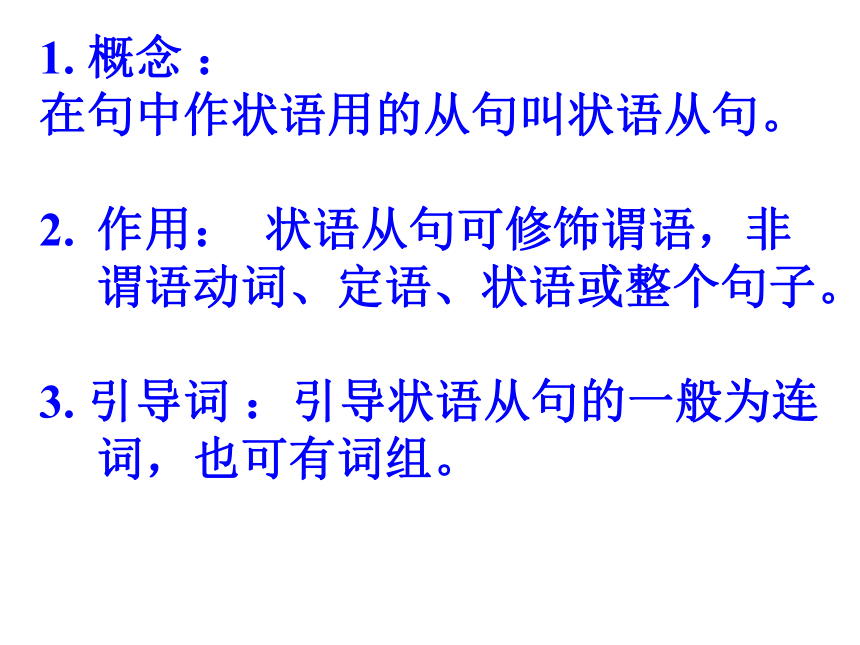
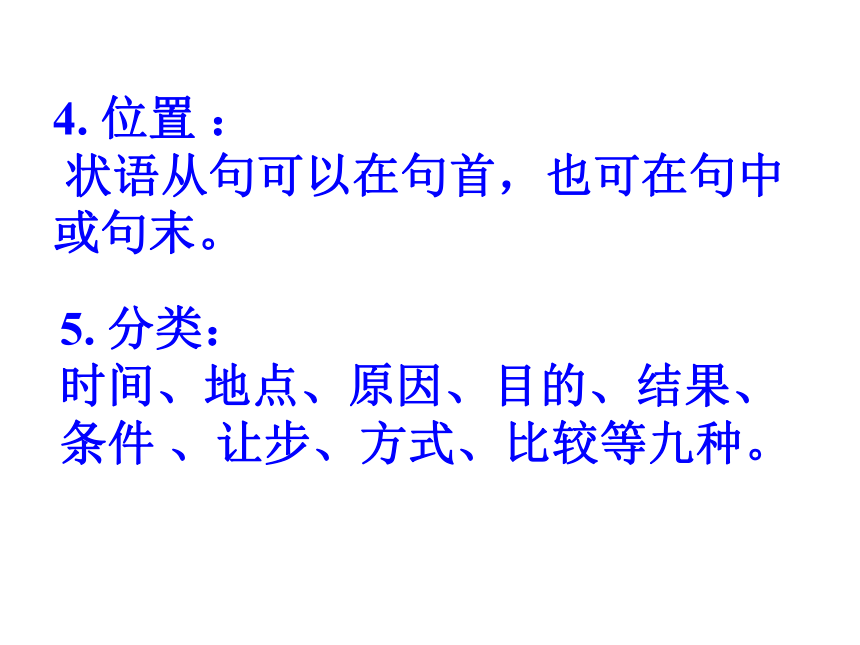

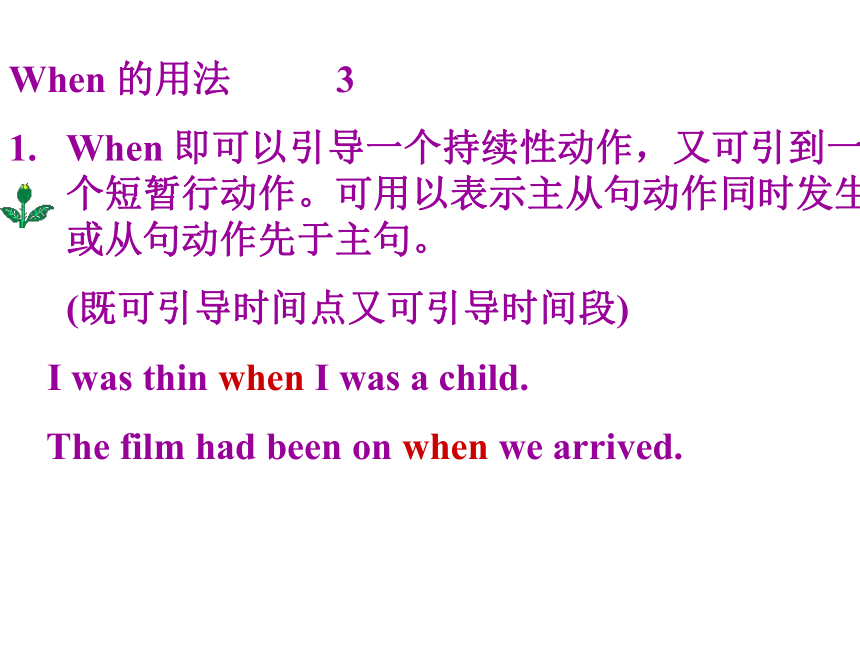
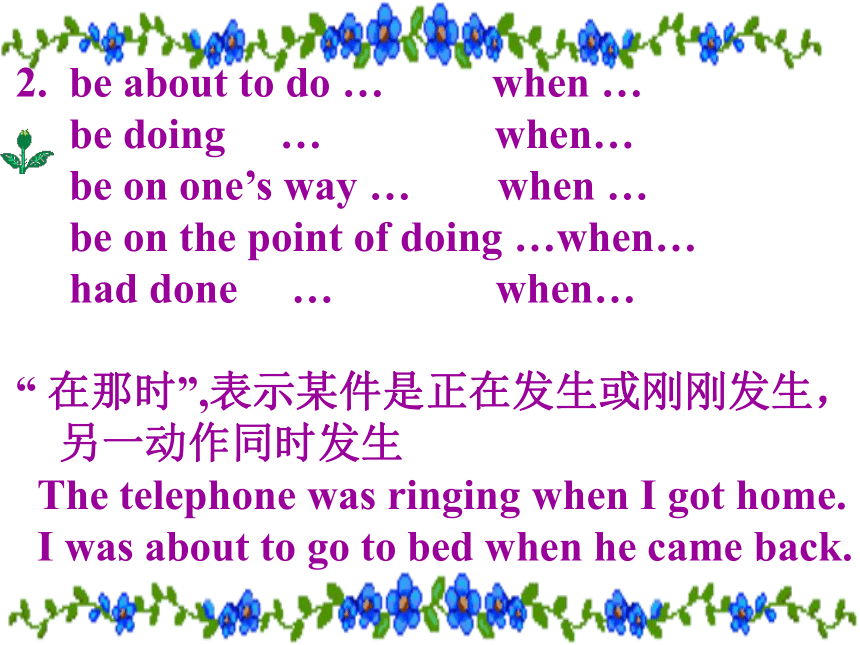
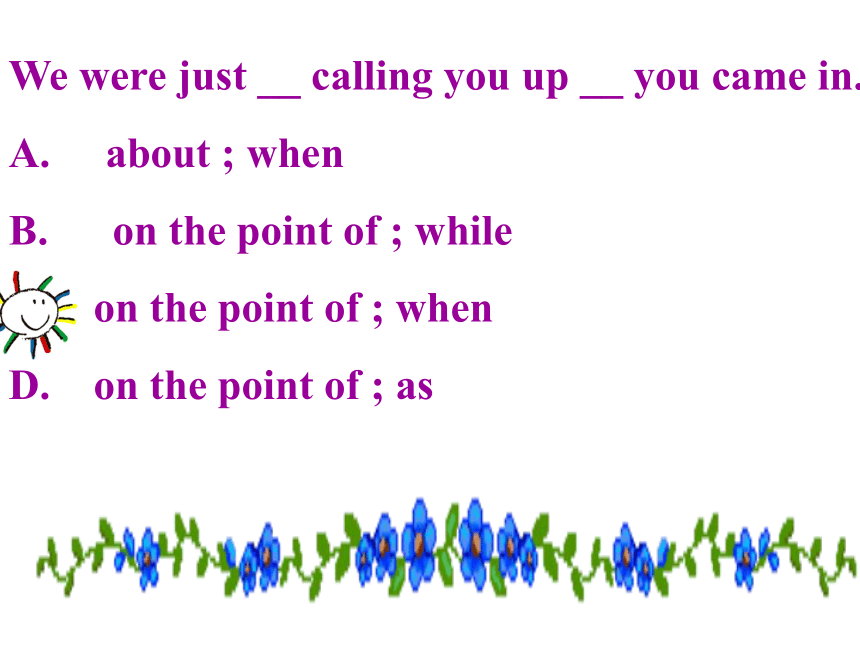
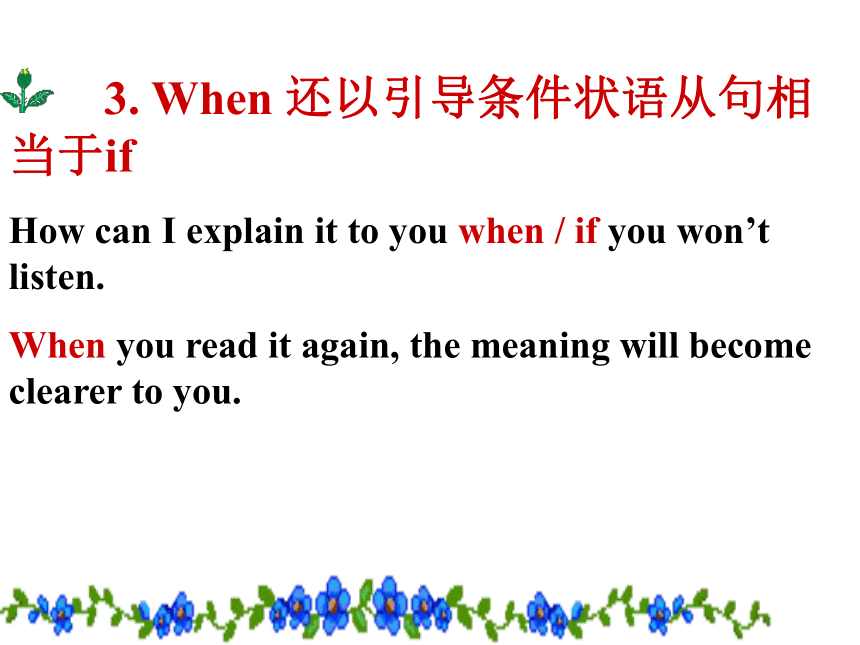
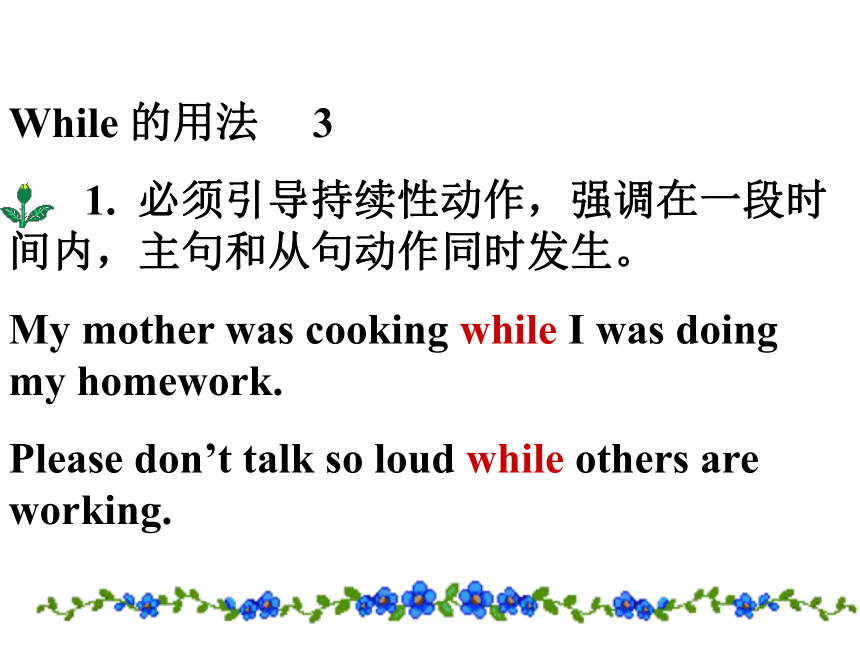
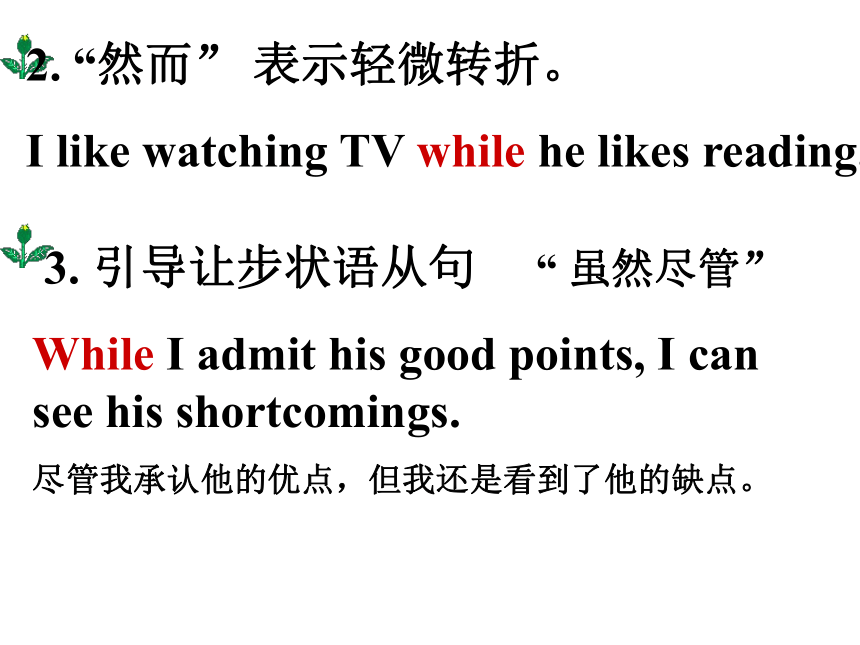
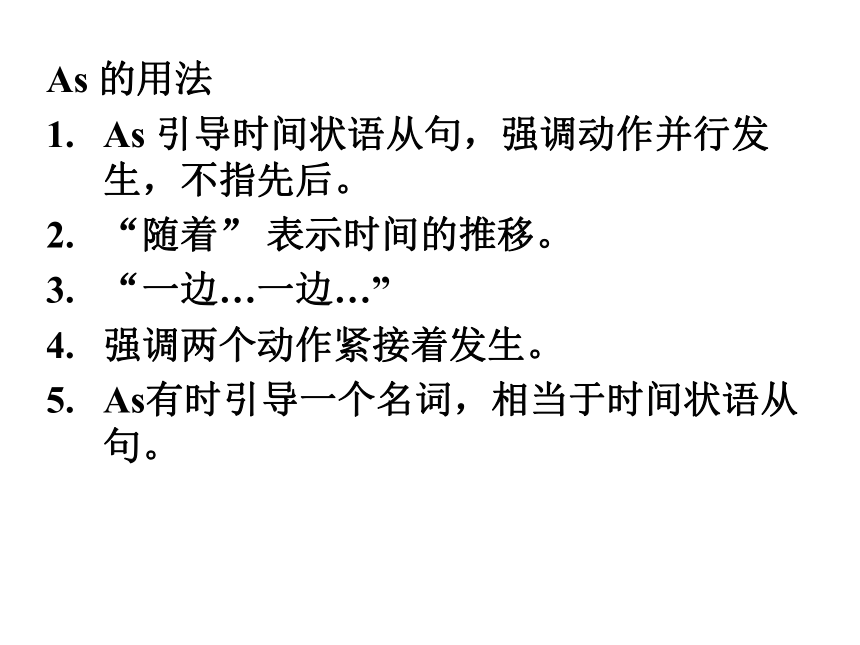
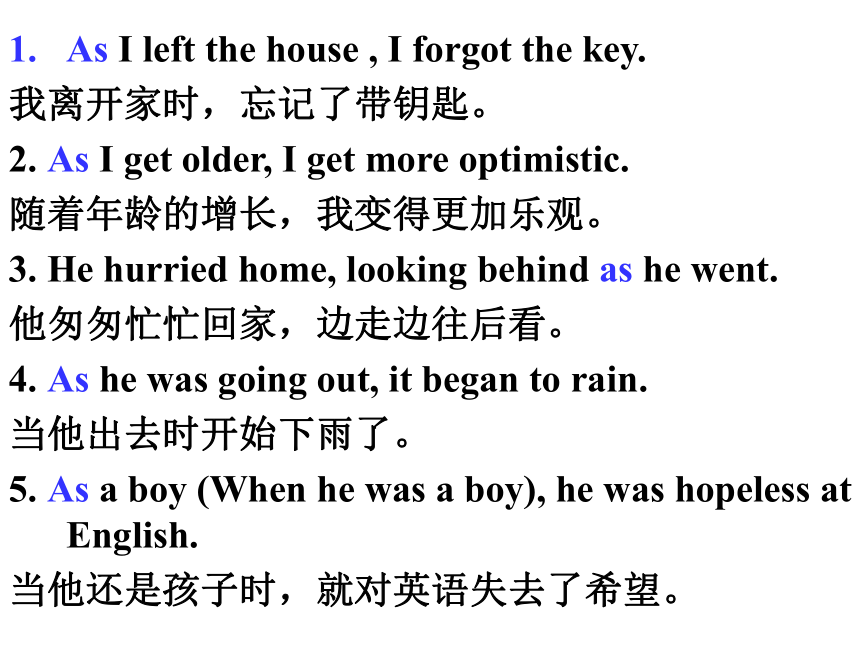
文档简介
(共58张PPT)
1. 概念 :
在句中作状语用的从句叫状语从句。
作用: 状语从句可修饰谓语,非谓语动词、定语、状语或整个句子。
3. 引导词 :引导状语从句的一般为连词,也可有词组。
5. 分类:
时间、地点、原因、目的、结果、
条件 、让步、方式、比较等九种。
4. 位置 :
状语从句可以在句首,也可在句中或句末。
When 的用法 3
When 即可以引导一个持续性动作,又可引到一个短暂行动作。可用以表示主从句动作同时发生或从句动作先于主句。
(既可引导时间点又可引导时间段)
I was thin when I was a child.
The film had been on when we arrived.
2. be about to do … when …
be doing … when…
be on one’s way … when …
be on the point of doing …when…
had done … when…
“ 在那时”,表示某件是正在发生或刚刚发生,另一动作同时发生
The telephone was ringing when I got home.
I was about to go to bed when he came back.
We were just __ calling you up __ you came in.
about ; when
B. on the point of ; while
C. on the point of ; when
D. on the point of ; as
3. When 还以引导条件状语从句相当于if
How can I explain it to you when / if you won’t listen.
When you read it again, the meaning will become clearer to you.
While 的用法 3
1. 必须引导持续性动作,强调在一段时间内,主句和从句动作同时发生。
My mother was cooking while I was doing my homework.
Please don’t talk so loud while others are working.
2. “然而” 表示轻微转折。
I like watching TV while he likes reading.
3. 引导让步状语从句 “ 虽然尽管”
While I admit his good points, I can see his shortcomings.
尽管我承认他的优点,但我还是看到了他的缺点。
As 的用法
As 引导时间状语从句,强调动作并行发生,不指先后。
“随着” 表示时间的推移。
“一边…一边…”
强调两个动作紧接着发生。
As有时引导一个名词,相当于时间状语从句。
.
As I left the house , I forgot the key.
我离开家时,忘记了带钥匙。
2. As I get older, I get more optimistic.
随着年龄的增长,我变得更加乐观。
3. He hurried home, looking behind as he went.
他匆匆忙忙回家,边走边往后看。
4. As he was going out, it began to rain.
当他出去时开始下雨了。
5. As a boy (When he was a boy), he was hopeless at English.
当他还是孩子时,就对英语失去了希望。
As I get older, I get more optimistic.
(时间)
Young as he is ,he knows a lot.
( 让步)
As he wasn’t ready in time, we went without him. ( 原因 )
Do as I told you. / do as you like.
( 方式 )
He is as old as I /me. ( 比较 )
I’m happy as long as you are happy.
( 条件 )
连接词when, while, as的用法区别:
1.while引导的时间状语从句的谓语动词必须是可延续的,
而when引导的时间状语从句的谓语动词是可延续的,也
可以是表短暂性动作的动词。如:
When/While he was eating his breakfast, he heard the doorbell ring.
When I stopped my car, a man came up to me.
2.从句动作发生在主句动作之前时,只能用when引导这个
从句,不可用as或while。
如: When you have finished your work, you may have a rest.
3.表示“随着…,一边…一边”,连词用as. 如:
As the election approached, the violence got worse.
4.如果主句表示的是短暂动作,而从句用延续性动作的进行时态表示在一段时间内正在进行的动作时,when, while
与as 可互换使用。
如:When/While/As I was walking down the street, I came across an old friend of mine.
问题1:
1. (北京春) We were swimming in the lake ______ suddenly the storm started.
A. when B. while C. until D. before
2. (上海) He was about to tell me the secret ______ someone
patted him on the shoulder.
A. as B. until C. while D. when
3. (上海) He transplanted the little tree to the garden ______ it
was the best time for it.
A. where B. when C. that D. until
4. (福建) -Did Jack come back early last night?
-Yes. It was not yet eight o’clock ____ he arrived home.
A. Before B. when C. that D. until
(注:句型:It is/was + 点时间+when从句)
A
D
B
B
问题2:
6. (天津) The cost of living in Glasgow is among the lowest in
Britain, ______ the quality of life is probably one of the highest.
A. since B. when C. as D. while
7. (年江苏) ______ I accept that he is not perfect, I do actually
like the person.
A. While B. Since C. Before D. Unless
8. (辽宁) He was about halfway through his meal ______ a
familiar voice came to his ears.
A. why B. where C. when D. while
D
A
C
Before 的用法 4
在…之前
It will (not) be +时间段+before+从句
“ 过了多久就、才… ” ; “过不了多久就/才…”
3. “还没来得及,就…”
4. “趁……”
Before they got to the bus stop, the bus had gone. 在..之前
It will be 5 years before he returns to his motherland. 过多久才…
We waited a long time before he came out.
过了多久就、才…
4. It won’t be long before we meet again.
过不了多久就
5. He died before he wrote a will. 还没来得及
6. Catch him before he escapes. 还没来得及
7. Please write it down before you forget it.
趁着
1. (年北京) He made a mistake, but then he
corrected the situation ______ it got worse.
A. until B. when C. before D. as
2. (福建) Scientists say it may be five or six years
______ it is possible to test this medicine on
human patients.
A. since B. after C. before D. when
3. (四川)-Why didn’t you tell him about the
meeting?
-He rushed out of the room____I could say a
word.
A. before B. until C. when D. after
C
C
A
till, until和not…until:
1.until/till引导时间状语从句用于肯定句时,主句的动词
是延续性动词,表示动作或状态一直持续到until/till所 表示的时间,意为“某动作一直延续到某时间点才停止”。如:
We waited until/till he came.
2.用于否定句时,主句谓语动词是非延续性动词,从句为肯定,意为“某动作直到某时间才开始”。如:
He won’t go to bed till/until she returns.
3.till不可以置于句首,而until可以。如:
Until you told me I had no idea of it.
4.not…until句型中的强调和倒装说法:
It was not until you told me that I had any idea of it.
Not until you told me did I have any idea of it.
倒装
1. (北京春) -Was his father very strict with him when
he was at school?
-Yes. He had never praised him ______ he became
one of the top students in his grade.
A. after B. unless C. until D. when
2. (上海) A good storyteller must be able to hold
listeners’ curiosity ______ he reaches the end of the
story.
A. when B. unless C. after D. until
3. It was not ______ she took off her dark glasses
______ I realized she was a famous film star.
A. when; that B. until; that
C. until; when D. when; then
C
D
B
Since 的用法
Since + 时间
Since then
ever since
It is + 时间段+ since …
*since 后为点动词“自从… 多久了”
*since 后为延续性动词“不…多久了”
与完成时态连用 “自从,…起”
Mr li has been here since 1998.
Mr li has been here since he came back.
It’s/has been two years since we arrived here.
我们到这儿两年了。
It is three years since he lived here. (延续)
他不在这儿住三年了。
It is two years since he smoked . (延续)
他不吸烟已有两年了。
比较:
It is two years since he began to smoke. (非延续性v)
他吸烟有两年了。
1. (北京春) It is almost five years ______ we saw each other last time.
A. before B. since
C. after D. because
2. That was really a splendid evening. It’s years _____ I enjoyed myself so much.
A. when B. that C. before D. since
B
D
表示“一……就……”的句型
As soon as , once
Immediately, directly
The moment
On doing sth. 或者on one’s +n.
Noon sooner …than
Hardly …when…
Scarcely …when…
1. As soon as he arrives, I will tell him.
2. Once you work hard, you will pass the exam.
3. The moment I saw him, I recognized him.
4. I left immediately the clock struck 5.
5. On hearing the news, he cried.
6. On his arrival at the classroom, the teacher came in .
7. Hardly had I got home when it began to rain.
8. No sooner had I got home than it began to rain.
倒装
一些含有time的名词短语和介词短语可以引导时间状语从句,如every time, each time, next time, any time the first (second, last…)time, by the time, from the time等,以及the day, the year, the week the morning等.
1. The day he returned home, his father was already dead.
2. Next time you come, please bring your composition
3. The first time I climbed onto the wall, I felt nervous.
4. You are welcome to come back any time you want to .
欢迎你随时回来。
5. The truck will have arrived by the time you have all the things packed up.
到你把所有东西都捆好的时候,卡车也就来了。
6. By the time he arrived, the train had already gone.
问题3:
1. (北京春)-Did you remember to give Mary the
money you owed her?
-Yes. I gave it to her ______ I saw her.
A. while B. the moment
C. suddenly D. once
2. (上海) I thought her nice and honest ______ I
met her.
A. first time B. for the first time
C. the first time D. by the first time
3. ______ entered the office when he realized that
he had forgotten his report.
A. He hardly had B. Had he hardly
C. Hardly had he D. Hardly he had
B
C
C
地点状语从句有where, wherever引导。
1. We must camp where we can get water.
2. I will follow you wherever you go.
3. Where there is a river, there is a city.
4. I will go where he went.
5. I will you wherever he goes.
地点状语从句和定语从句的区别。
Go back where you came from.
Go back to the place where you came from.
引导原因状语从句的连词有
because, since as , now that, not that…but that…; seeing that… ;considering that…; in that…
Because
表示原因是语气最强,经常表示听者未知的原因.即可以回答why的提问,又可以放在强调句型中成为被强调的部分。
I can’t go, because I’m ill.
He failed because he was too careful.
It is because you are lazy that you have lost the job.
Not because …but because …
I didn’t help him not because I was unwilling, but because I was unable to do it.
(不是因为…而是因为…)
The football match was put off because it rained.
The football match was put off because of the rain.
Since 引导的语气次于because,表示稍加分析后推断出的原因,或指的是人们一致的事实。“ 既然,鉴于”常放于句首。
Since no one is against it, let’s carry out the plan.
As
语气最弱,其原因只是对结果的附带说明。一般放句首。
As he wasn’t ready in time, we went without him.
For 属于并列连词,但不能直接说明原因,而是对某种情况加以推断用于表示补充说明的理由。常放于句末。
He must be ill, for he is absent today.
The spring is coming, for the birds are singing.
Now that 用了说明一种新的情况,然后加以推论,位于句首,that 可省略。“ 既然,鉴于”
Now (that) everybody is here, let’s begin.
Seeing (that) …; considering (that )…; in that
Seeing / considering (that ) he is so young, that is excusable (可原谅的)
鉴于他如此年轻,这是可以原谅的。
Not that …but that…
Not that she forgot to do her homework, but that she was busy nursing a sick classmate.
她不是忘了做作业,而是他忙着照顾一位生病的同学。
形容词后的that 从句
I’m glad (that) you told me that news.
I feel proud (that) our country is getting stronger and stronger.
引导目的状语的连词有so; so that; in order that; in case; for fear that…目的状语从句中的谓语动词通常使用情态动词can, could, may, might, should, would…
We sit nearer the front so (that) we can hear better.
Come early in order that / so that you can see him.
He put his money in the safe for fear that it should be stolen.(他把钱放在保险箱里生怕/以防被盗)
He runs fast in order to / so as to arrive there early.
.
Take an umbrella in case it rains.(以防)
It may not rain, but you’d better take an umbrella in case.(以防万一)
Take an umbrella in case of rain.(介词 )
In case 后的从句使用一般现在时表示将来,或使用一般过去时表示过去将来,也可用情态动词, 或者从句中使用should, should也可以省略。
Take an umbrella in case it rains.
He left early in case he (should) miss the last train.
他动身很早以防误了最后一班火车。
比较状语从句的连词:as…as (和…一样); not as/so …as(和…不一样), than;
the more …the more…
She studies harder than I (study).
He looks younger than he is.
他看上去比实际年龄年轻。
The more you read, the more knowledge you can get.
He is as old as I .
结果状语从句连词:so …that ; such …that; with the result that…
1. She was so happy that she cried .
2. She worked very hard, so that she became rich in a very short time.(她努力工作很快就致富了。)
3. He made such an excellent speech that everyone admired him.
So 为副词,修饰形容词,副词,
Such 为形容词,修饰名词。
So + adj.
So + adj. + a/an + 单n.
So + many/few+ 复数n.+ that
So +much/little(多少)+ 不可数n. +that
Such +a/an +adj. + 单n.+ that
Such +adj. +复数n.+ that
Such +adj. + 不可数n. + that…
He was so honest that we all trust him.
He was such an honest man that we all trust him.
There was so much work that we couldn’t finish it.
There were so many people that we couldn’t get in.
It was such nice weather that we want to go out.
So …that..; such …that… 句型中,so ,such 位于句首,
主句须部分倒装
So terrible was the storm that some houses were destroyed.
If 如果
If only / only if 要是若是
Unless 除非
As long as / so long as 只要
In case万一
Once
when
祈使句+and /or /or else/ otherwise + 将来时态
…
If it is fine tomorrow, we shall have a spring outing.
If I had money, I would buy the car.
If only he gets the job, it will make a big difference.
(他要是能得到这份工作,情况就不同了。)
How can I explain it to you when you won’t listen
I’m happy as long as you are happy.
In case he comes, let me know.
Once you need my help, please tell me.
1. I will go there tomorrow unless it rains.
除非下雨否则明天我就去那儿。
2. You will be late unless you leave immediately.
3. You will fail in English unless you work harder.
4. We won’t keep winning games unless we keep playing well.
5. Unless English(英国队) improve their game, they are going to lose the match.
*条件状语从句的时间一般现在时表示将来。
If you go I will go.
*省略 If necessary ,if possible …
(北京春)
-Was his father very strict with him when he was at school?
-Yes. He had never praised him ______ he became one of the top students in his grade.
A. after B. unless C. until D. when
1. Do as I told you .
2. A is to B what C is to D.
Air is to us what water is to fish.
3. I remember it as if it were yesterday.
4. As it is/ was.,句首“事实上”句末“按原来的样子,照现在的样子”
Leave it as it is. 别动它(让它保持原来的样子)
Although ,though ,as, even though/if, while; whenever, whatever...-ever ;
whether... or ..(不管…)
Although/though it was hot, he kept on working.
主句中可以用yet, still,但不能用but,
2. Although/though I believe it, yet I must consider.
3. He said he would help me; he didn’t, though.
他说他会帮我,但是他并没有帮我。
Even if /though it rains ,we will make a trip.
While I admit his good points, I can see his shortcomings. (尽管)
3. Whether we go to your place or stay here, we’ve still got to find something to eat.
(不管是去你那里还是待在这,我们还是的找点吃的)
4. Wherever you go , I will follow you.
5. Poor as /though he is, he is generous。
6. Much as/though I love it, I will not buy it.
7. Child as/though he is , he knows a lot.
8. Try as/though I might ,I failed .
9. However much it may cost, I will buy it.
10.No matter how much it may cost, I will buy it.
状语从句省略,
从句主语与主句一样,又有be动词,主系同时省。
状语从句主语是it,动词是be,it 和be 同时剩略。
1. Be careful while (you are) crossing the road.
2. I’ll buy a TV set if (it is) necessary.
1. 概念 :
在句中作状语用的从句叫状语从句。
作用: 状语从句可修饰谓语,非谓语动词、定语、状语或整个句子。
3. 引导词 :引导状语从句的一般为连词,也可有词组。
5. 分类:
时间、地点、原因、目的、结果、
条件 、让步、方式、比较等九种。
4. 位置 :
状语从句可以在句首,也可在句中或句末。
When 的用法 3
When 即可以引导一个持续性动作,又可引到一个短暂行动作。可用以表示主从句动作同时发生或从句动作先于主句。
(既可引导时间点又可引导时间段)
I was thin when I was a child.
The film had been on when we arrived.
2. be about to do … when …
be doing … when…
be on one’s way … when …
be on the point of doing …when…
had done … when…
“ 在那时”,表示某件是正在发生或刚刚发生,另一动作同时发生
The telephone was ringing when I got home.
I was about to go to bed when he came back.
We were just __ calling you up __ you came in.
about ; when
B. on the point of ; while
C. on the point of ; when
D. on the point of ; as
3. When 还以引导条件状语从句相当于if
How can I explain it to you when / if you won’t listen.
When you read it again, the meaning will become clearer to you.
While 的用法 3
1. 必须引导持续性动作,强调在一段时间内,主句和从句动作同时发生。
My mother was cooking while I was doing my homework.
Please don’t talk so loud while others are working.
2. “然而” 表示轻微转折。
I like watching TV while he likes reading.
3. 引导让步状语从句 “ 虽然尽管”
While I admit his good points, I can see his shortcomings.
尽管我承认他的优点,但我还是看到了他的缺点。
As 的用法
As 引导时间状语从句,强调动作并行发生,不指先后。
“随着” 表示时间的推移。
“一边…一边…”
强调两个动作紧接着发生。
As有时引导一个名词,相当于时间状语从句。
.
As I left the house , I forgot the key.
我离开家时,忘记了带钥匙。
2. As I get older, I get more optimistic.
随着年龄的增长,我变得更加乐观。
3. He hurried home, looking behind as he went.
他匆匆忙忙回家,边走边往后看。
4. As he was going out, it began to rain.
当他出去时开始下雨了。
5. As a boy (When he was a boy), he was hopeless at English.
当他还是孩子时,就对英语失去了希望。
As I get older, I get more optimistic.
(时间)
Young as he is ,he knows a lot.
( 让步)
As he wasn’t ready in time, we went without him. ( 原因 )
Do as I told you. / do as you like.
( 方式 )
He is as old as I /me. ( 比较 )
I’m happy as long as you are happy.
( 条件 )
连接词when, while, as的用法区别:
1.while引导的时间状语从句的谓语动词必须是可延续的,
而when引导的时间状语从句的谓语动词是可延续的,也
可以是表短暂性动作的动词。如:
When/While he was eating his breakfast, he heard the doorbell ring.
When I stopped my car, a man came up to me.
2.从句动作发生在主句动作之前时,只能用when引导这个
从句,不可用as或while。
如: When you have finished your work, you may have a rest.
3.表示“随着…,一边…一边”,连词用as. 如:
As the election approached, the violence got worse.
4.如果主句表示的是短暂动作,而从句用延续性动作的进行时态表示在一段时间内正在进行的动作时,when, while
与as 可互换使用。
如:When/While/As I was walking down the street, I came across an old friend of mine.
问题1:
1. (北京春) We were swimming in the lake ______ suddenly the storm started.
A. when B. while C. until D. before
2. (上海) He was about to tell me the secret ______ someone
patted him on the shoulder.
A. as B. until C. while D. when
3. (上海) He transplanted the little tree to the garden ______ it
was the best time for it.
A. where B. when C. that D. until
4. (福建) -Did Jack come back early last night?
-Yes. It was not yet eight o’clock ____ he arrived home.
A. Before B. when C. that D. until
(注:句型:It is/was + 点时间+when从句)
A
D
B
B
问题2:
6. (天津) The cost of living in Glasgow is among the lowest in
Britain, ______ the quality of life is probably one of the highest.
A. since B. when C. as D. while
7. (年江苏) ______ I accept that he is not perfect, I do actually
like the person.
A. While B. Since C. Before D. Unless
8. (辽宁) He was about halfway through his meal ______ a
familiar voice came to his ears.
A. why B. where C. when D. while
D
A
C
Before 的用法 4
在…之前
It will (not) be +时间段+before+从句
“ 过了多久就、才… ” ; “过不了多久就/才…”
3. “还没来得及,就…”
4. “趁……”
Before they got to the bus stop, the bus had gone. 在..之前
It will be 5 years before he returns to his motherland. 过多久才…
We waited a long time before he came out.
过了多久就、才…
4. It won’t be long before we meet again.
过不了多久就
5. He died before he wrote a will. 还没来得及
6. Catch him before he escapes. 还没来得及
7. Please write it down before you forget it.
趁着
1. (年北京) He made a mistake, but then he
corrected the situation ______ it got worse.
A. until B. when C. before D. as
2. (福建) Scientists say it may be five or six years
______ it is possible to test this medicine on
human patients.
A. since B. after C. before D. when
3. (四川)-Why didn’t you tell him about the
meeting?
-He rushed out of the room____I could say a
word.
A. before B. until C. when D. after
C
C
A
till, until和not…until:
1.until/till引导时间状语从句用于肯定句时,主句的动词
是延续性动词,表示动作或状态一直持续到until/till所 表示的时间,意为“某动作一直延续到某时间点才停止”。如:
We waited until/till he came.
2.用于否定句时,主句谓语动词是非延续性动词,从句为肯定,意为“某动作直到某时间才开始”。如:
He won’t go to bed till/until she returns.
3.till不可以置于句首,而until可以。如:
Until you told me I had no idea of it.
4.not…until句型中的强调和倒装说法:
It was not until you told me that I had any idea of it.
Not until you told me did I have any idea of it.
倒装
1. (北京春) -Was his father very strict with him when
he was at school?
-Yes. He had never praised him ______ he became
one of the top students in his grade.
A. after B. unless C. until D. when
2. (上海) A good storyteller must be able to hold
listeners’ curiosity ______ he reaches the end of the
story.
A. when B. unless C. after D. until
3. It was not ______ she took off her dark glasses
______ I realized she was a famous film star.
A. when; that B. until; that
C. until; when D. when; then
C
D
B
Since 的用法
Since + 时间
Since then
ever since
It is + 时间段+ since …
*since 后为点动词“自从… 多久了”
*since 后为延续性动词“不…多久了”
与完成时态连用 “自从,…起”
Mr li has been here since 1998.
Mr li has been here since he came back.
It’s/has been two years since we arrived here.
我们到这儿两年了。
It is three years since he lived here. (延续)
他不在这儿住三年了。
It is two years since he smoked . (延续)
他不吸烟已有两年了。
比较:
It is two years since he began to smoke. (非延续性v)
他吸烟有两年了。
1. (北京春) It is almost five years ______ we saw each other last time.
A. before B. since
C. after D. because
2. That was really a splendid evening. It’s years _____ I enjoyed myself so much.
A. when B. that C. before D. since
B
D
表示“一……就……”的句型
As soon as , once
Immediately, directly
The moment
On doing sth. 或者on one’s +n.
Noon sooner …than
Hardly …when…
Scarcely …when…
1. As soon as he arrives, I will tell him.
2. Once you work hard, you will pass the exam.
3. The moment I saw him, I recognized him.
4. I left immediately the clock struck 5.
5. On hearing the news, he cried.
6. On his arrival at the classroom, the teacher came in .
7. Hardly had I got home when it began to rain.
8. No sooner had I got home than it began to rain.
倒装
一些含有time的名词短语和介词短语可以引导时间状语从句,如every time, each time, next time, any time the first (second, last…)time, by the time, from the time等,以及the day, the year, the week the morning等.
1. The day he returned home, his father was already dead.
2. Next time you come, please bring your composition
3. The first time I climbed onto the wall, I felt nervous.
4. You are welcome to come back any time you want to .
欢迎你随时回来。
5. The truck will have arrived by the time you have all the things packed up.
到你把所有东西都捆好的时候,卡车也就来了。
6. By the time he arrived, the train had already gone.
问题3:
1. (北京春)-Did you remember to give Mary the
money you owed her?
-Yes. I gave it to her ______ I saw her.
A. while B. the moment
C. suddenly D. once
2. (上海) I thought her nice and honest ______ I
met her.
A. first time B. for the first time
C. the first time D. by the first time
3. ______ entered the office when he realized that
he had forgotten his report.
A. He hardly had B. Had he hardly
C. Hardly had he D. Hardly he had
B
C
C
地点状语从句有where, wherever引导。
1. We must camp where we can get water.
2. I will follow you wherever you go.
3. Where there is a river, there is a city.
4. I will go where he went.
5. I will you wherever he goes.
地点状语从句和定语从句的区别。
Go back where you came from.
Go back to the place where you came from.
引导原因状语从句的连词有
because, since as , now that, not that…but that…; seeing that… ;considering that…; in that…
Because
表示原因是语气最强,经常表示听者未知的原因.即可以回答why的提问,又可以放在强调句型中成为被强调的部分。
I can’t go, because I’m ill.
He failed because he was too careful.
It is because you are lazy that you have lost the job.
Not because …but because …
I didn’t help him not because I was unwilling, but because I was unable to do it.
(不是因为…而是因为…)
The football match was put off because it rained.
The football match was put off because of the rain.
Since 引导的语气次于because,表示稍加分析后推断出的原因,或指的是人们一致的事实。“ 既然,鉴于”常放于句首。
Since no one is against it, let’s carry out the plan.
As
语气最弱,其原因只是对结果的附带说明。一般放句首。
As he wasn’t ready in time, we went without him.
For 属于并列连词,但不能直接说明原因,而是对某种情况加以推断用于表示补充说明的理由。常放于句末。
He must be ill, for he is absent today.
The spring is coming, for the birds are singing.
Now that 用了说明一种新的情况,然后加以推论,位于句首,that 可省略。“ 既然,鉴于”
Now (that) everybody is here, let’s begin.
Seeing (that) …; considering (that )…; in that
Seeing / considering (that ) he is so young, that is excusable (可原谅的)
鉴于他如此年轻,这是可以原谅的。
Not that …but that…
Not that she forgot to do her homework, but that she was busy nursing a sick classmate.
她不是忘了做作业,而是他忙着照顾一位生病的同学。
形容词后的that 从句
I’m glad (that) you told me that news.
I feel proud (that) our country is getting stronger and stronger.
引导目的状语的连词有so; so that; in order that; in case; for fear that…目的状语从句中的谓语动词通常使用情态动词can, could, may, might, should, would…
We sit nearer the front so (that) we can hear better.
Come early in order that / so that you can see him.
He put his money in the safe for fear that it should be stolen.(他把钱放在保险箱里生怕/以防被盗)
He runs fast in order to / so as to arrive there early.
.
Take an umbrella in case it rains.(以防)
It may not rain, but you’d better take an umbrella in case.(以防万一)
Take an umbrella in case of rain.(介词 )
In case 后的从句使用一般现在时表示将来,或使用一般过去时表示过去将来,也可用情态动词, 或者从句中使用should, should也可以省略。
Take an umbrella in case it rains.
He left early in case he (should) miss the last train.
他动身很早以防误了最后一班火车。
比较状语从句的连词:as…as (和…一样); not as/so …as(和…不一样), than;
the more …the more…
She studies harder than I (study).
He looks younger than he is.
他看上去比实际年龄年轻。
The more you read, the more knowledge you can get.
He is as old as I .
结果状语从句连词:so …that ; such …that; with the result that…
1. She was so happy that she cried .
2. She worked very hard, so that she became rich in a very short time.(她努力工作很快就致富了。)
3. He made such an excellent speech that everyone admired him.
So 为副词,修饰形容词,副词,
Such 为形容词,修饰名词。
So + adj.
So + adj. + a/an + 单n.
So + many/few+ 复数n.+ that
So +much/little(多少)+ 不可数n. +that
Such +a/an +adj. + 单n.+ that
Such +adj. +复数n.+ that
Such +adj. + 不可数n. + that…
He was so honest that we all trust him.
He was such an honest man that we all trust him.
There was so much work that we couldn’t finish it.
There were so many people that we couldn’t get in.
It was such nice weather that we want to go out.
So …that..; such …that… 句型中,so ,such 位于句首,
主句须部分倒装
So terrible was the storm that some houses were destroyed.
If 如果
If only / only if 要是若是
Unless 除非
As long as / so long as 只要
In case万一
Once
when
祈使句+and /or /or else/ otherwise + 将来时态
…
If it is fine tomorrow, we shall have a spring outing.
If I had money, I would buy the car.
If only he gets the job, it will make a big difference.
(他要是能得到这份工作,情况就不同了。)
How can I explain it to you when you won’t listen
I’m happy as long as you are happy.
In case he comes, let me know.
Once you need my help, please tell me.
1. I will go there tomorrow unless it rains.
除非下雨否则明天我就去那儿。
2. You will be late unless you leave immediately.
3. You will fail in English unless you work harder.
4. We won’t keep winning games unless we keep playing well.
5. Unless English(英国队) improve their game, they are going to lose the match.
*条件状语从句的时间一般现在时表示将来。
If you go I will go.
*省略 If necessary ,if possible …
(北京春)
-Was his father very strict with him when he was at school?
-Yes. He had never praised him ______ he became one of the top students in his grade.
A. after B. unless C. until D. when
1. Do as I told you .
2. A is to B what C is to D.
Air is to us what water is to fish.
3. I remember it as if it were yesterday.
4. As it is/ was.,句首“事实上”句末“按原来的样子,照现在的样子”
Leave it as it is. 别动它(让它保持原来的样子)
Although ,though ,as, even though/if, while; whenever, whatever...-ever ;
whether... or ..(不管…)
Although/though it was hot, he kept on working.
主句中可以用yet, still,但不能用but,
2. Although/though I believe it, yet I must consider.
3. He said he would help me; he didn’t, though.
他说他会帮我,但是他并没有帮我。
Even if /though it rains ,we will make a trip.
While I admit his good points, I can see his shortcomings. (尽管)
3. Whether we go to your place or stay here, we’ve still got to find something to eat.
(不管是去你那里还是待在这,我们还是的找点吃的)
4. Wherever you go , I will follow you.
5. Poor as /though he is, he is generous。
6. Much as/though I love it, I will not buy it.
7. Child as/though he is , he knows a lot.
8. Try as/though I might ,I failed .
9. However much it may cost, I will buy it.
10.No matter how much it may cost, I will buy it.
状语从句省略,
从句主语与主句一样,又有be动词,主系同时省。
状语从句主语是it,动词是be,it 和be 同时剩略。
1. Be careful while (you are) crossing the road.
2. I’ll buy a TV set if (it is) necessary.
